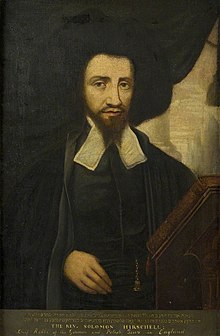Something about history which fascinates me is - time. The passage of time. And for this, reminiscences are important. There are many people who can tell you things about people and events which too place 80 years ago, and certainly 50 years ago (hopefully some of them are reading!). Talk to them, ask them. And then, you should live long, tell people yourself what you heard in 30 or 60 years from now - and just like that: someone gets to hear something close to a firsthand account that is almost one and a half centuries old. It may be 2013, but there are people who can still tell you all about people they knew who were born before Lincoln was elected president.
Related to this: to me, in some ways, the 1870s don't seem that long ago. But the 1810s? Well, that's already getting remote. So I really enjoy reading things like the following, a reminiscence of Rabbi Solomon Hirschell (d. 1842), Chief Rabbi in London, which was published in the Jewish Messenger in 1873.
True, much of it is about how Hirschell kind of had a lousy singing voice, but the descriptions of his preparations for leading the Ne'ilah prayer, the coaching by two singers, his booming and intense Shema, are fascinating. Also the anecdotes about how he barred the use of musical notes and a tuning fork - it had to be explained to him what a tuning fork was - and how one particularly zealous worshiper (a man of note) tattled to him, to say that the Chazan has used a piece from the opera Don Juan in singing Kaddish - and the attempts to explain to Hirschell what the opera Don Juan was, and that Don Juan was not a person who did not belong in shul - all interesting. "The synagogue is not an opera house," Hirschell concluded, not really caring in the end if Don Juan was a person or an opera.
Finally, the writer of this piece makes a contribution to the "rabbis becoming doctors" trope (often attributed to Milton Himmelfard, which I blogged about here: Sadly, the first part of the quote is illegible. But here is the rest of it:
"In those [days]... those who held rabbinical offices. This may have arisen from the circumstances that then there was but little spiritual sickness in Israel, hence they wanted no Doctors, while now sluggishness and indifference have caused so much mental disease, as to require doctoring. Hence, I suppose, it occurs that the Rabbi has been superceded by the doctor."
I'm not precisely sure when "those days" were - but one imagines it could have been the 1810s, or perhaps early 1820s.
Here's Hirschel, roughly the same age as the Chasam Sofer, younger brother of Saul Berlin, of Besamim Rosh infamy:

And the article:








Is that simply Mozart's Don Giovanni ?
ReplyDeleteThat would be my guess. The opera was based on the Spanish literary character of Don Juan Tenorio. I'm further guessing that the people in the news article pronounced the name as "Don Jew-un," as Lord Byron did in his poem of the same name, published 1819-1824.
ReplyDeleteThe chazzan that we had for the Yamim Noraim in the early '60's made discreet use of a tuning fork, and I used to wonder how kosher that was. According to DailyHalacha.com, the Arukh Ha-Shulhan OK'd its use on Shabbos, the Mishnah Berurah disagreed, and R. Ovadiah Yosef accordingly ruled that "one should preferably refrain from using a tuning fork on Shabbat and Yom Tov, in deference to those authorities who rule stringently on this issue. However, one should not object forcefully to those who are lenient in this regard, as they do have authorities on whom to rely."
Can't say that I do. Care to elaborate?
ReplyDeletehttp://www.jpress.org.il/Default/Scripting/ArticleWin.asp?From=Search&sSorting=Score%2Cdesc&Key=OCC%2F1843%2F04%2F01%2F50%2FAr05000%2Exml&PageLabelPrint=50&AW=1369945877652&CollName=OCC_Default&DOCID=13&sScopeID=All&Skin=TAUHe&enter=true&Publication=OCC&sQuery=eiger&sPublication=OCC&Hs=advanced&rEntityType=&sSearchInAll=false&tauLanguage=&ViewMode=GIF&Continuation=0
ReplyDeleteDeath of Chief Rabbi Hirschel - News story in The Occident